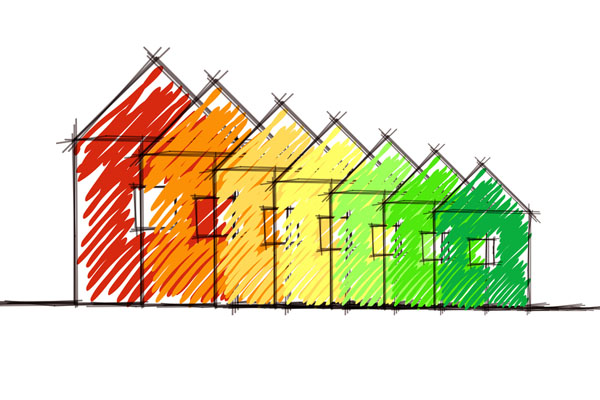How AFUE Ratings Impact Your Heating Costs And Comfort

When contemplating a new heating system, the term ‘Annual Fuel Utilization Efficiency (AFUE)’ often surfaces. This serves as a critical indicator of a unit’s performance. This metric gauges the effectiveness of your furnace or boiler in converting fuel into usable heat throughout the year. A higher AFUE rating signals greater energy efficiency and translates to reduced operational costs and lower environmental impact.
At McAllister Energy, we prioritize helping you understand the implications of AFUE ratings, ensuring you can choose the most energy-efficient solution for your home. This guide delves into the nuances of AFUE ratings, discussing their impact on energy usage, ongoing expenses, and the environment, thereby equipping you with the knowledge to make well-informed heating decisions.
Understanding the Significance of AFUE Ratings
Contents
- 1 Understanding the Significance of AFUE Ratings
- 2 How Furnace and Boiler AFUE Ratings Affect Energy Consumption
- 3 Selecting the Ideal AFUE Rating for Optimal Home Heating
- 4 Enhancing and Maintaining Your Heating System
- 5 Heating Efficiency FAQs
- 6 Conclusion
- 7 Contact McAllister Energy for Top-Quality HVAC Services
In the upcoming sections, we will delve into how AFUE ratings directly influence the energy consumption and operational costs of your heating system. Understanding these ratings will help you make more informed and effective decisions about your home heating options.
Decoding the Ratings of Heating System Efficiency

AFUE, or Annual Fuel Utilization Efficiency, quantifies the percentage of fuel that a heating system converts into usable heat throughout a heating season. For instance, an AFUE rating of 85% indicates that 85% of the fuel is effectively utilized for heating, while the remaining 15% is lost, typically through exhaust or evaporation.
This metric is fundamental for evaluating heating systems, distinguishing it from other HVAC efficiency metrics like SEER (Seasonal Energy Efficiency Ratio) used for air conditioners and HSPF (Heating Seasonal Performance Factor) for assessing heat pump efficiency.
AFUE ratings are derived from standardized testing protocols mandated by the Department of Energy. These tests mimic actual operating conditions to accurately measure the heat output relative to the energy consumed.
This uniform approach to measuring efficiency plays a crucial role in helping consumers select heating systems that are efficient and conducive to enhanced energy management and significant cost savings.
Discover Dependable Heating Solutions!
Reach out to McAllister Energy today for reliable services you can count on. Don’t wait—call us now to ensure your home stays warm and comfortable!
How Furnace and Boiler AFUE Ratings Affect Energy Consumption
Grasping the variances in AFUE ratings is key to managing your home’s energy usage and optimizing cost savings.
Benefits of High AFUE Ratings

Furnaces with high AFUE ratings, especially those exceeding 90%, bring substantial advantages such as reduced energy bills and enhanced comfort. These high-efficiency units employ sophisticated technologies, including condensing systems and modulating flames.
For instance, condensing furnaces recover exhaust heat to boost efficiency while modulating flames dynamically adjust the burner’s output to meet the precise heating needs of the home. This tailored approach minimizes fuel use and cuts emissions, positioning these furnaces as eco-friendly heating solutions.
Drawbacks of Low AFUE Ratings
Heating systems with AFUE ratings ranging from 56% to 70% often exhibit significant inefficiencies. These older models tend to waste substantial amounts of fuel, escalating energy expenses over time. Homeowners with these lower-rated systems might experience rising heating bills and decreased comfort due to the system’s inability to maintain steady temperatures.
Furthermore, the inefficiency often results in more frequent needs for repairs and replacements, compounding the long-term costs. Upgrading to a high-efficiency heating system can alleviate these problems and save energy.
Seeking Top-Notch Heating Services?
Get in touch with McAllister Energy now to guarantee your home remains warm and inviting this winter. Don’t hesitate—call us today!
Selecting the Ideal AFUE Rating for Optimal Home Heating
Choosing the right AFUE rating is essential to maximize heating efficiency and achieve cost-effective energy use in your home.
Key Factors in Choosing the Right AFUE Rating

When deciding on the most suitable AFUE rating for your home, several critical considerations should guide your choice:
- Home Size: Larger homes generally need systems with higher AFUE ratings for sufficient heating.
- Local Climate: Homes in colder regions typically benefit from more efficient systems to ensure consistent comfort.
- Insulation Quality: Homes with better insulation may not require as high an AFUE rating to achieve effective heating.
- Personal Comfort Preferences: Your comfort requirements might also influence the efficiency level you need from your heating system.
Seeking Expert Heating Guidance?
Connect with McAllister Energy for professional advice and premier heating installation services. Contact us today for personalized assistance!
Financial Benefits of High-Efficiency Heating Systems
Selecting a heating system with a high AFUE rating can lead to substantial savings on your energy bills. These systems are designed to use fuel more efficiently, reducing consumption and thus decreasing monthly expenses. Although high-efficiency units come with a higher initial cost, the long-term financial benefits typically offset this initial outlay. Homeowners can expect to recover their investment over time through lower energy costs, making high-efficiency systems a prudent choice for immediate comfort and ongoing savings.
Legal and Environmental Impacts of High Efficiency Ratings

Federal and state laws set minimum AFUE ratings to enhance energy efficiency and lower emissions from heating systems. For instance, the Department of Energy requires gas furnaces to have at least an 80% AFUE rating and oil furnaces to meet a minimum of 82%. These regulations reduce overall energy usage and support the Environmental Protection Agency’s initiatives to fight climate change and improve air quality.
Choosing heating systems with 90% or higher AFUE ratings brings considerable environmental advantages. These systems emit fewer greenhouse gases and lessen dependence on fossil fuels, aligning with broader energy conservation and environmental protection goals. Homeowners are urged to reflect on the extensive impacts of their heating decisions, as opting for efficient systems saves money and is crucial in fostering a sustainable future.
Explore Cost-Effective Heating Solutions!
Call McAllister Energy today to learn about affordable and efficient heating options. Don’t wait—dial now to start saving!
Enhancing and Maintaining Your Heating System
Considering upgrading to a heating system with a higher AFUE rating is wise if your existing unit often requires repairs, fails to keep a steady temperature, or is approaching or beyond its expected lifespan—usually 15 to 20 years for most models. Systems with superior AFUE ratings heat more efficiently, leading to lower energy costs, but they also generally last longer due to reduced wear and more sophisticated technology.
Consistent maintenance is essential to maintaining your heating system’s efficiency and preserving its AFUE rating. Annual servicing by a qualified professional can keep the system running at peak efficiency and prolong its useful life.
Regular maintenance tasks like cleaning or replacing filters, adjusting thermostat settings, and inspecting exhaust outlets are critical for ensuring your heating system operates at its best. These practices counteract the typical inefficiencies that develop with time, allowing your system to function as designed. Maintaining your heating system properly maximizes energy savings and enhances environmental benefits.
Heating Efficiency FAQs

What Sets AFUE Apart from Energy Star Ratings?
AFUE ratings focus solely on a heating system’s ability to convert fuel into heat throughout a standard year, represented as a percentage. This metric assesses the direct efficiency of furnaces and boilers. On the other hand, Energy Star ratings signify a broader certification from the Environmental Protection Agency (EPA). Products that earn the Energy Star label adhere to stringent energy efficiency standards set across multiple categories, including heating systems, appliances, and other technologies.
Do AFUE Ratings Decline with Time?
Yes, a heating system’s AFUE ratings can diminish over the years, largely due to wear and tear and the accumulation of dust and debris. Regular professional maintenance is essential to help a system maintain efficiency as close as possible to its initial performance.
Are Tax Benefits Available for High Efficiency-Rated Systems?
Yes, numerous local and federal government programs provide rebates, tax credits, or other incentives to homeowners who install high-efficiency heating systems with certain AFUE ratings or better. These initiatives are crafted to promote energy conservation by encouraging the adoption of more efficient heating technologies.
Looking for High-Quality Heating Services?
Contact McAllister Energy today for top-tier heating solutions and outstanding customer service. Don’t hesitate—call us now!
How Can I Check the Efficiency Rating of My Heating System?
The AFUE rating of a heating system is typically found on the energy guide label or the manufacturer’s faceplate on the equipment. If these are not easily accessible, an HVAC professional can inspect your system and assess its current efficiency rating.
Does a Higher AFUE Rating Always Lead to Lower Heating Bills?
A higher AFUE rating signifies improved efficiency in converting fuel to heat, but the extent to which it lowers heating bills can differ based on various elements. These include the climate in your area, the current prices of fuel, your home’s size and insulation levels, and your typical heating practices. Although systems with high AFUE ratings are designed to be more cost-effective, these surrounding conditions can still influence the total financial benefits.
Conclusion
Grasping the significance of AFUE ratings is crucial when selecting an efficient heating system that meets your energy consumption objectives and budgetary needs. Engaging with McAllister Energy allows you to receive tailored advice, ensuring you choose the optimal heating options for your residence. Don’t hesitate to contact McAllister Energy if you want to upgrade your heating system or require routine maintenance to enhance its efficiency. Our team of experts is prepared to help you maximize comfort and savings in your home.
Secure Your Comfort with McAllister Energy!
Connect with us today for professional heating services designed to meet your needs and ensure your satisfaction. Call McAllister Energy now!
Contact McAllister Energy for Top-Quality HVAC Services
McAllister Energy provides elite heating and cooling solutions across Camden County, NJ, employing a team of highly skilled, professionally certified technicians proficient in HVAC tune-ups, repairs, installations, and replacements. Our experts ensure precise and thorough servicing of your HVAC system.
We are known for offering the area’s most cost-effective heating and cooling services. Choosing our maintenance services can improve your comfort and increase energy efficiency, reducing your heating and cooling costs. Whether you need an HVAC repair or are considering a new installation, we are ready to help you find the perfect solution that aligns with your budget.
We back our services with a satisfaction guarantee. Call McAllister Energy today for a complimentary in-home consultation or to schedule a service appointment. Don’t hesitate—call now!
You can click here to contact us now or call us at (856) 665-4545 to find out more! Click the link to view our service area.

Related Articles:
- Seasonal Energy Savings: How to Keep Your Home Energy-Efficient All Year
- Exposing Hidden Energy Hogs: Spotting And Tackling Home Energy Waste
- The Science Behind How Heating Oil Radiators: How Does It Work?
- Proper Oil Burner Care: Is Your System Overdue For Maintenance?
- Is Your HVAC Blower Motor Failing? 5 Signs to Watch Out For